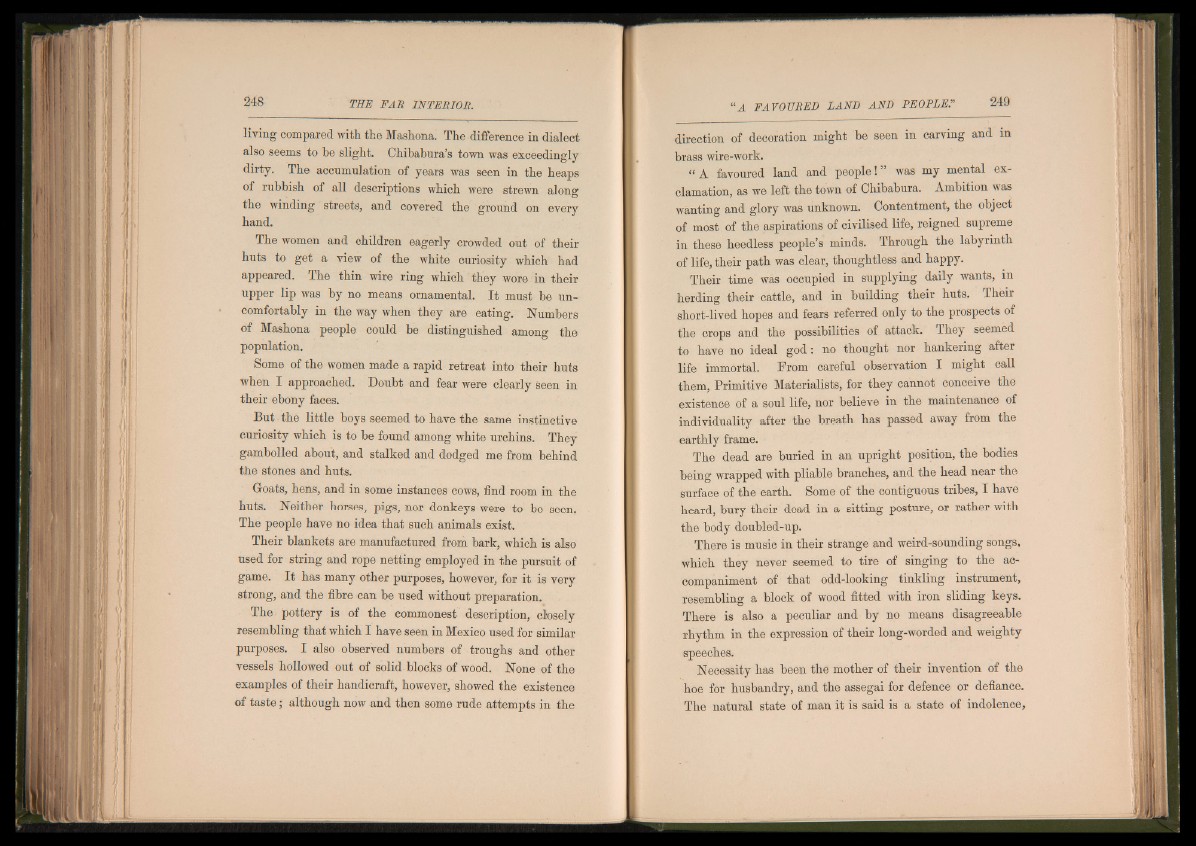
living compared with the Mashona. The difference in dialect
also seems to he slight. Chibabura’s town was exceedingly
dirty. The accumulation of years was seen in the heaps
of rubbish of all descriptions which were strewn along
the winding streets, and covered the ground on every
hand.
The women and children eagerly crowded out of their
huts to get a view of the white curiosity which had
appeared. The thin wire ring which they wore in their
upper lip was by no means ornamental. It must be uncomfortably
in the way when they are eating. Numbers
of Mashona people could be distinguished among the
population.
Some of the women made a rapid retreat into their huts
when I approached. Doubt and fear were clearly seen in
their ebony faces.
But the little boys seemed to have the same instinctive
curiosity which is to be found among white urchins. They
gambolled about, and stalked and dodged me from behind
the stones and huts.
Groats, hens, and in some instances cows, find room in the
huts. Neither horses, pigs, nor donkeys were to be seen.
The people have no idea that such animals exist.
Their blankets are manufactured from bark, which is also
used for string and rope netting employed in the pursuit of
game. I t has many other purposes, however, for it is very
strong, and the fibre can be used without preparation.
The. pottery is of the commonest description, closely
resembling that which I have seen in Mexico used for similar
purposes. I also observed numbers of troughs and other
vessels hollowed out of solid blocks of wood. None of the
examples of their handicraft, however, showed the existence
of taste ; although now and then some rude attempts in the
direction of decoration might be seen in carving and in
brass wire-work.
“ A favoured land and people ! ” was my mental exclamation,
as we left the town of Chibabura. Ambition was
wanting and glory was unknown. Contentment, the object
of most of the aspirations of civilised life, reigned supreme
in these heedless people’s minds. Through the labyrinth
of life, their path was clear, thoughtless and happy.
Their time was occupied in supplying daily wants, in
herding their cattle, and in building their huts. Their
short-lived hopes and fears referred only to the prospects of
the crops and the possibilities of attack. They seemed
to have no ideal god : no thought nor hankering after
life immortal. From careful observation I might call
them, Primitive Materialists, for they cannot conceive the
existence of a soul life, nor believe in the maintenance of
individuality after the breath has passed away from the
earthly frame.
The dead are buried in an upright position, the bodies
being wrapped with pliable branches, and the head near the
surface of the earth. Some of the contiguous tribes, I have
heard, bury their dead in a sitting posture, or rather with
the body doubled-up.
There is music in their strange and weird-sounding songs,
which they never seemed to tire of singing to the accompaniment
of that odd-looking tinkling instrument,
resembling a block of wood fitted with iron sliding keys.
There is also a peculiar and by no means disagreeable
rhythm in the expression of their long-worded and weighty
speeches.
Necessity has been the mother of their invention of the
hoe for husbandry, and the assegai for defence or defiance.
The natural state of man it is said is a state of indolence,